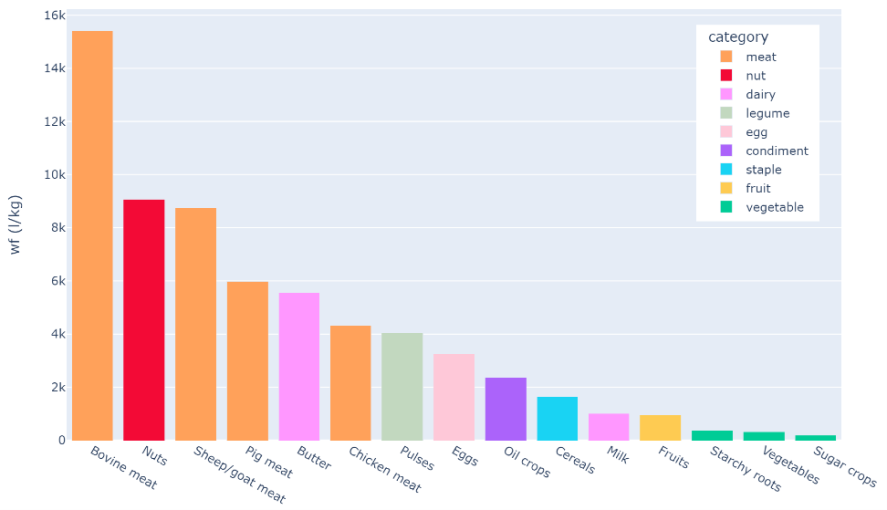Food Recommendations for Reducing Water Footprint

Water use is one of the critical aspects of planetary health, especially nowadays where we face wasteful water management and issues such as water scarcity. It is one of the most pressing environmental issues since water is a resource that both human and planet need to live (Rijsberman, 2006). The food industry is one of the most water-intensive industries, as every food product needs a particular amount of water to be produced (Hoekstra, 2003). To measure the water use, the metric Water Footprint has been introduced and defined as the total amount of freshwater used to generate consumed goods (Hoekstra, 2009). It has been shown that a diet high in vegetables and legumes and low in red meat reduces user’s water footprint while improving health (Blas, 2016).
The study presents and assesses the effectiveness of a personalized food recommendation system that suggests recipes with lower water footprints ingredients to consumers, considering their food preferences. The system is based on two datasets: Planeat.eco, an Italian website selling ready ingredients and instructions for cooking recipes; and a dataset collected from Food.com, an American recipe website.
A system created to suggest tailored recipes, adapted to users’ behavior, with lower water footprints
The developed system gives two score: a score to recipes from 1 to 5 (recipes with the lowest water footprint to the highest one), and a score to the user (from A to E) based on his orders history. The system combines these two scores and can thus recommend the user specific recipes that belong to a certain category with a lower water footprint than the ones consumed by the user.
Water footprint data represents the water used in production stage only. They were collected from the Water Footprint Network (WFN), an official collaborative platform, and from the HEALabel website for ingredients not provided by the WFN.
The system is therefore made up with three units: 1/ a recipe classifier that sorts recipes based on their water footprint, 2/ a user classifier according to user’s history, and 3/ a recommendation algorithm that considers consumer’s favourite recipes in order to recommend the best combinations.
Fruit, vegetables, and grains have a minimal water footprint whereas animal-based foods require large use of water resources to be produced.
According to the WFN, beef has a water footprint of 15,415 l/kg which is 70 times higher than the water footprint of vegetables as their footprint do not exceed 250 liters per kg (Figure 1). Statistics shown in the following figure are also confirmed by scientific studies, highlighting that a healthy diet high in fruit and vegetables is more sustainable in terms of water footprint than those high in animal-based products (Tompa, 2022).

The proposed system understands the user’s behaviour, suggests tailored recipes, and reduce water footprints
When evaluating the algorithm of this system to determine whether it takes users’ behaviour into account, the results showed that recipes recommendations were comparable to other systems in terms of Root Mean Square Error (RMSE) ratios. This demonstrates that the suggested recipes are quite similar to the user’s dietary patterns.
As regards the effect of the system on water footprint reduction, results showed that, the average water footprint of recipes was reduced by roughly 50% with the Planeat.eco dataset, and by 52% with the Food.com dataset (from around 23k L to 10,5k L).
Therefore, the system developed guarantees a significant water footprint reduction with tailored recommendations for the users.
In conclusion, the authors suggest the Mediterranean diet as a reference diet as it is high in fruit, vegetables, fish, and little meat. The system they propose understands user’s behaviour and suggests recipes with lower water footprints while improving the diet.
Based on: Gallo et al., Food Recommendations for Reducing Water Footprint, Sustainability 2022, 14, 3833.
- The system proposed understands user’s behaviour and suggests recipes with lower water footprints
- The system helps consumers to reduce their water footprint while having a healthier diet
- Results of this system are reliable to results from the literature.
